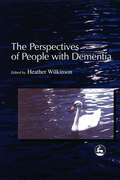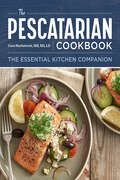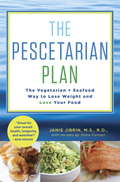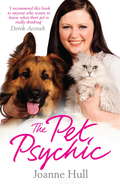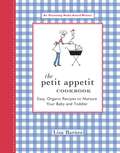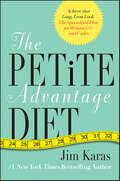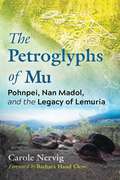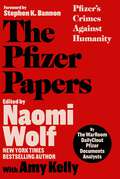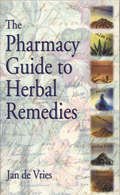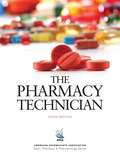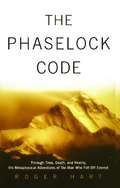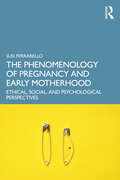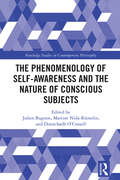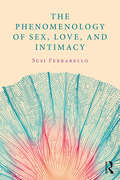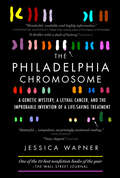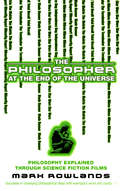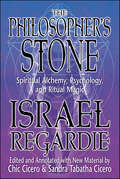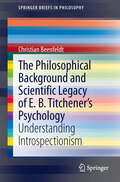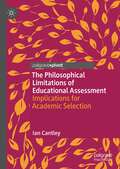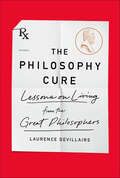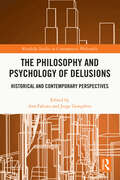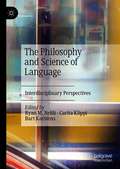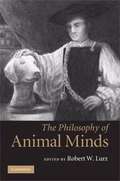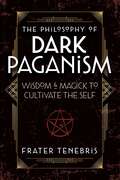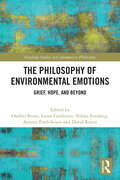- Table View
- List View
The Perspectives of People with Dementia: Research Methods and Motivations
by Heather Wilkinson Alison BowesPeople with dementia have often played a passive role in the investigation of their condition. The contributors to this book look at ways of redressing the balance and involving them in the research process. They describe the skills that researchers and care staff need, and the methods they can use, when seeking to draw out and validate the views of people with dementia successfully, and discuss the ways in which such views can be included in debates about dementia methodology and policy. The book focuses on a number of projects which have taken different approaches to working with people with dementia in research, including a chapter examining the difficult process of interviewing people with dementia whose first language is not English and a chapter describing a project which encourages people with dementia to participate in the analysis of the research findings. This varied and innovative book will help those in the fields of health and social policy, dementia research and dementia care to hear the voices of people with dementia more clearly, and to include their opinions more effectively in the provision of services.
The Pescatarian Cookbook: The Essential Kitchen Companion
by Cara Harbstreet MS, RD, LDThe Pescatarian Cookbook is the definitive kitchen companion to the pescatarian diet with fundamental information, recipes, and healthy meal plans.Rich in fish and seafood, hearty vegetables, and wholesome grains—pescatarianism is a varied and balanced diet. The Pescatarian Cookbook is a complete reference to reap all benefits of this naturally nutritious diet with essential information, recipes, and healthy meal plans.From Zucchini Pancakes with Smoked Salmon for breakfast to Grilled Swordfish with Chimichurri and Roasted Vegetables for dinner, this pescatarian cookbook offers perfectly portioned pescatarian plates for every meal. Complete with 3 weeks' worth of meal plans—that include shopping lists and tips for meal prep—The Pescatarian Cookbook is your go-to reference to make the pescatarian diet a sustainable and satisfying lifestyle.The Pescatarian Cookbook is a recipe for good health and great taste with:An essential introduction that explains everything you need to know to follow the pescatarian diet, including the health benefits, pantry staples and cooking equipment, plus shopping and storage tips.75 recipes for breakfasts, soups and salads, vegetable mains, seafood mains, sides and snacks, and dessert!3 one-week meal plans that take the guesswork out of what you should eat and when, and provides shopping lists to do the rest of the heavy lifting.There's more to the pescatarian diet than eating seafood. Get a healthy dose of vitamins and minerals from both the land and sea with the recipes and meal plan from The Pescatarian Cookbook.
The Pescetarian Plan
by Janis Jibrin Sidra FormanWith more than 100 mouthwatering recipes, switching to a vegetable- and seafood-based diet has never been easier, healthier--or more delicious! You can go vegetarian to slim down, help reduce your risk for cancer and cardiovascular disease, feel great, and probably live longer. Or you can eat fish to help protect your heart, quell appetite, stay sharp, be happier, and even have better skin. (You read that right!) Better yet, you can enjoy the best of both worlds with The Pescetarian Plan--a delicious, easy-to-follow, one-of-a-kind program for weight loss and optimal physical and mental well-being. Inspired by the traditional Mediterranean way of eating ("pesce" is the Italian word for "fish," and "pesca" is Spanish for "fishing," thus the alternate spelling "pescatarian"), veteran nutritionist Janis Jibrin, M.S., R.D., offers step-by-step portion- and meal-planning instructions, including a wide variety of quick and easy breakfast, lunch, and dinner recipes to help you meet your weight-loss and health goals. She shares her deep knowledge of the science behind the healthiest diet on the planet, deftly explaining the amazing potential benefits of eating the pescetarian way--including whittling your waist, reducing chronic inflammation, preventing arterial plaque, and possibly warding off Alzheimer's. She also breaks down the latest information about mercury, overfishing, and the environmental impact of your ingredient choices. With Chef Sidra Forman's expert guidance, you'll become confident in the kitchen--fish and other types of seafood are much easier to prepare (and much harder to mess up!) than you may think. And the mouthwatering recipes and photos--including Broiled Trout with Preserved Lemon and Thyme, Grilled Shrimp with Peach BBQ Sauce, Roasted Chick Pea Snacks, Blueberries Baked with Sweet Cream, and Chocolate Cupcakes with Mint Icing--give you options the whole family will love. Quite Possibly the Healthiest Eating Style on the Planet! On the Pescetarian Diet you will: * See inches around the waist disappear * Feel more active and productive * Fill your plate with the best, most nutritious food * Stop counting calories--it's all in the portions * Go at your own pace: start slowly or dive right in * Really enjoy your food and its many benefits.
The Pet Psychic
by Joanne HullJoanne Hull always knew there was something that made her different from other children. Whilst other girls her age were playing with dolls, Joanne was busy collecting any stray animal that came her way, until her parent’s backyard resembled a zoo. As she grew older she realised that she was developing incredible powers that allowed her to psychically connect with, and talk to, animals. For the last ten years Joanne has used the animal spirit world to help owners across the country understand troubled pets, find missing ones and, most amazingly, contact those we’ve lost to the other side. Joanne has given hundreds of spine-chillingly accurate readings – and for the first time she shares the sometimes heart-warming, sometimes heart-breaking, but always extraordinary stories that have formed her life as The Pet Psychic.
The Petit Appetit Cookbook: Easy, Organic Recipes to Nurture Your Baby and Toddler
by Lisa BarnesFresh, wholesome meals that give little mouths something to smile about... In The Petit Appetit Cookbook, mother and professional cook Lisa Barnes offers a healthy all-organic alternative to commercially processed, preservative-filled foods to help create delicious menus, nurture adventurous palates, and begin a lifetime of positive eating habits for children. Includes: 150+ easy, fast, child-tested recipes for ages 4 months to 4 years - Mealtime solutions for even the most finicky eaters - Nutritional information for each recipe - Time-saving cooking techniques - The right age and stage appropriate food choices - How and when to introduce solids to baby's diet - Adapting family recipes for young children - Recognizing signs of food allergies and intolerances.
The Petite Advantage Diet: The Specialized Plan for Women 5'4" and Under
by Jim KarasIn The Petite Advantage Diet, weight-loss expert Jim Karas delivers a breakthrough lifestyle guide that’s already revolutionizing the world of health and fitness: the first book of its kind designed exclusively for women 5’4” and under.Readers of his New York Times bestselling book The Business Plan for the Body can testify to how his advice has helped millions of women find their way to fitter, firmer, healthier, and happier lives. Now Jim Karas reveals a program designed for petite women, for whom The Belly Fat Cure can’t offer a real cure and 21 Pounds in 21 Days means losing too much too quickly: The Petite Advantage Diet.Achieve that long, lean look—and eat the right foods to feel full fast—with the specialized diet for women 5'4" and under.
The Petroglyphs of Mu: Pohnpei, Nan Madol, and the Legacy of Lemuria
by Carole Nervig• Shows how the archetypal symbols of the Pohnpaid petroglyphs have exact counterparts in other ancient cultures throughout the world • Provides evidence that Pohnpaid is closely related to--yet predates--neighboring Nan Madol • Includes hundreds of Pohnpaid petroglyphs and stone circle photos, many never before seen While residing on the small Pacific island of Pohnpei in the 1990s, Carole Nervig discovered that a recent brush fire had exposed hundreds of previously unknown petroglyphs carved on gigantic boulders. This portion of the megalithic site called Pohnpaid was unknown even to Pohnpei&’s state historic preservation officer. The petroglyphs were unlike others from Oceania, so Nervig began investigating and comparing them with petroglyphs and symbols from around the world.In this fully illustrated exploration, Nervig documents her discoveries on Pohnpei, revealing how the archetypal symbols of the Pohnpaid petroglyphs have exact counterparts in other ancient cultures and universal motifs throughout the world, including the Australian Aborigines, the Inca in Peru, the Vedic civilization of India, early Norse runes, and Japanese symbols. She provides evidence that Pohnpaid is closely related to--yet predates--neighboring Nan Madol and shows how Pohnpaid was an outpost of the sunken Kahnihmueiso, a city of the now-vanished civilization of Mu, or Lemuria.Discussing the archaeoastronomical function of the Pohnpaid stones, the author examines how many of the glyphs symbolize celestial phenomena and clearly reveal how their creators were sky watchers with a sophisticated understanding of astronomy, geophysics, geomancy, and engineering. She shows how the scientific concepts depicted in the petroglyphs reveal how the citizens of Mu had a much deeper understanding of the living Earth than we do, which gave them the ability to manipulate natural forces both physically and energetically. Combining archaeological evidence with traditional oral accounts, Nervig reveals Pohnpaid not only as a part of a geodetic network of ancient sacred sites and portals but also as a remnant of the now submerged but once enlightened Motherland of Mu.
The Pfizer Papers: Pfizer's Crimes Against Humanity
by The WarRoom/DailyClout Pfizer Documents AnalystsThe Pfizer Papers features new reports written by WarRoom/DailyClout research volunteers, which are based on the primary source Pfizer clinical trial documents released under court order and on related medical literature. The book shows in high relief that Pfizer&’s mRNA COVID-19 vaccine clinical trial was deeply flawed and that the pharmaceutical company knew by November 2020 that its vaccine was neither safe nor effective. The reports detail vaccine-induced harms throughout the human body, including to the reproductive system; show that women suffer vaccine-related adverse events at a 3:1 ratio; expose that vaccine-induced myocarditis is not rare, mild, or transient; and, shockingly, demonstrate that the mRNA vaccines have created a new category of multi-system, multi-organ disease, which is being called &“CoVax Disease.&” Despite the fact that Pfizer committed in its own clinical trial protocol to follow the placebo arm of its trial for twenty-four months, Pfizer vaccinated approximately 95 percent of placebo recipients by March 2021, thus eliminating the trial&’s control group and making it impossible for comparative safety determinations to be made. Just as importantly, The Pfizer Papers makes it clear that the US Food and Drug Administration knew about the shortfalls of Pfizer&’s clinical trial as well as the harms caused by the company&’s mRNA COVID vaccine product, thus highlighting the FDA&’s abject failure to fulfill its mission to &“[protect] the public health by ensuring the safety, efficacy, and security of human and veterinary drugs, biological products, and medical devices.&” The Pfizer Papers offers an in-depth look at how Big Pharma, the US government, and healthcare entities stand protected behind the broad legal immunity provided by the Public Readiness and Emergency Preparedness Act (PREP Act) when creating, prescribing, and administering vaccines; and, under that shield of protection, do what is best for their bottom lines rather than for the health and well-being of Americans.
The Pharmacy Guide to Herbal Remedies
by J VriesThe Pharmacy Guide to Herbal Remedies is the first in a series of books by Jan de Vries. It is written with a common sense approach and explains how herbal remedies can complement today's lifestyle by combining natural cures with pharmaceutical and orthodox medicines. The book demonstrates that, despite an age and society blighted by modern day diseases, it is possible for every person to maintain and obtain optimum health by combining complementary and orthodox healthcare methods. This book should be in every household as a quick and easy reference guide.
The Pharmacy Technician (Sixth Edition)
by Perspective PressThe Pharmacy Technician, Sixth Edition, is a valuable tool for pharmacy technician students. Endorsed by the American Pharmacists Association (APhA), this book prepares students for national certification exams such as the Pharmacy Technician Certification Exam (PTCE) and the Exam for Certification of Pharmacy Technicians (ExCPT). This book is a practical text for understanding the principles, career concepts, and pharmacy skills needed to be a successful pharmacy technician. It offers clear, concise information to help students learn the material and pass the national certification exams.
The Phaselock Code: Through Time, Death and Reality -- The Metaphysical Adventures of Man
by Roger HartONE MAN'S REMARKABLE SEARCH FOR THE ULTIMATE TRUTHS OF OUR WORLD. For Professor Roger Hart, life truly began after he almost lost his -- in a horrific fall off the slopes of Mount Everest that he miraculously survived. This near-death experience sparked a desire in him to devote his studies to the very nature of human consciousness, in order to unlock the code of reality that binds our world. On an adventure of discovery that would take him around the world, Hart would experience life-altering transcendental events in Tibet, Morocco, and Tierra del Fuego -- opening the door to a true understanding of the nature of man. In this groundbreaking volume, he explores the participation of consciousness in the creation of reality, challenging the traditional scientific view of time, space, and objectivity -- and describing in detail his own metaphysical journey, which has involved synchronicity, precognition, and telekinesis. It is an exploration of the very things that make us human -- and a quest that touches upon the meaning of life itself.
The Phenomenology of Pregnancy and Early Motherhood: Ethical, Social, and Psychological Perspectives
by Susi FerrarelloThe Phenomenology of Pregnancy and Early Motherhood provides an ethical, social, and psychological investigation of the process of becoming a mother. Through a phenomenological analysis that engages with feminist philosophy, medical ethics, philosophy of care, and phenomenological psychology, Susi Ferrarello unravels the intricacies of this transformative phase of life to shed light on layers of lived experiences that impact the well-being of the woman. This book addresses the complexity of common lived-experiences characterizing this transition; the overarching period from the first to the fourth trimester, issues concerning maternal-fetal bonding, breastfeeding, PDAM, loss of identity and coming back to work. Enriched by case studies from Ferrarello’s philosophical counseling practice, the book provides a compassionate and insightful exploration of the struggles, triumphs, and moments of self-revelation that mothers encounter in their daily lives. By exploring the heart of the maternal experience, this book shows the often-unspoken realities faced by women as they strive to balance their roles as caregivers, partners, and individuals. The book offers a powerful means for everyday reflection on early motherhood and the ethical, as well as practical, dilemmas it raises. This text is an essential resource for graduate students studying phenomenology, ethics, feminist philosophy, moral psychology, as well as therapists and professionals interested in the challenges of pregnancy, motherhood, and women’s mental health.
The Phenomenology of Self-Awareness and the Nature of Conscious Subjects (Routledge Studies in Contemporary Philosophy)
by Julien Bugnon Martine Nida-Rümelin Donnchadh O’ConaillThis volume explores the connections between the phenomenology of self-awareness and the metaphysical nature of subjects of experience, bringing together two important research areas in contemporary philosophy of mind into fruitful engagement with one another.The phenomenology of self-awareness concerns what it is like to be aware of oneself in various conscious experiences such as perceiving, recollecting, experiencing agency, or emotions. The metaphysical nature of subjects of experience raises questions concerning whether subjects are physical or non-physical entities, whether they are substances or bundles of properties, and what it is for subjects to have experiences. The ten original essays in this volume are grouped into thematic sections covering the following topics: the nature of self-awareness and its relation to conscious experience, the metaphysical nature of the subject of experience, and whether self-awareness can reveal anything about the metaphysical nature of the subject. Each chapter is accompanied by comments from another contributor to the volume and a response from the author.The Phenomenology of Self-Awareness and the Nature of Conscious Subjects will appeal to researchers and advanced students working in analytic philosophy of mind.
The Phenomenology of Sex, Love, and Intimacy
by Susi FerrarelloThe Phenomenology of Sex, Love, and Intimacy presents a phenomenological exploration of love as it manifests itself through sexual desires and intimate relationships. Setting up a unique dialogue between psychology and philosophy, Susi Ferrarello offers a perspective through which clinicians can inform their practice on diverse issues of human sexuality. Drawing on Husserl’s phenomenology, Ferrarello’s analysis of love spans a range of disciplines including psychology, theology, biology, epistemology, and axiology, as well as areas related to gender, consent, and political control. Combining Husserlian perspectives on ethics with a focus on lived-experience, this text will deepen therapists’ understanding of love as the subject of interdisciplinary inquiry and enable them to locate questions of sexuality and intimacy within an academic framework. With key theoretical principles included to allow clinicians to think through and clarify their practice, this book will be a valuable tool for sex therapists, marriage and family therapists, and counselors, as well as psychology and philosophy students alike.
The Philadelphia Chromosome: A Genetic Mystery, A Lethal Cancer, And The Improbable Invention Of A Lifesaving Treatment
by Jessica WapnerOne of The Wall Street Journal’s 10 Best Nonfiction Books of the Year Philadelphia, 1959: A scientist scrutinizing a single human cell under a microscope detects a missing piece of DNA. That scientist, David Hungerford, had no way of knowing that he had stumbled upon the starting point of modern cancer research— the Philadelphia chromosome. It would take doctors and researchers around the world more than three decades to unravel the implications of this landmark discovery. In 1990, the Philadelphia chromosome was recognized as the sole cause of a deadly blood cancer, chronic myeloid leukemia, or CML. Cancer research would never be the same. Science journalist Jessica Wapner reconstructs more than forty years of crucial breakthroughs, clearly explains the science behind them, and pays tribute—with extensive original reporting, including more than thirty-five interviews—to the dozens of researchers, doctors, and patients with a direct role in this inspirational story. Their curiosity and determination would ultimately lead to a lifesaving treatment unlike anything before it. The Philadelphia Chromosome chronicles the remarkable change of fortune for the more than 70,000 people worldwide who are diagnosed with CML each year. It is a celebration of a rare triumph in the battle against cancer and a blueprint for future research, as doctors and scientists race to uncover and treat the genetic roots of a wide range of cancers.
The Philosopher At The End Of The Universe: Philosophy Explained Through Science Fiction Films
by Mark Rowlands'It's Schopenhauer and the will. It's Plato, it's Hume, Baudrillard and the concept of the Nietzschean superman!' Keanu Reeves on The MatrixThe Philosopher at the End of the Universe allows anyone to understand basic philosophical concepts from the comfort of their armchair, through the plots and characters of spectacular blockbusting science-fiction movies. Learn about: The Nature of Reality from The Matrix; Good and Evil from Star Wars; Morality from Aliens; Personal Identity from Total Recall; The Mind-Body Dilemma from Terminator; Free Will from Minority Report; Death and the Meaning of Life from Blade Runner; and much more. As someone once said, things must be said and knowledge known, and the cast list assembled to tell us does not disappoint: Tom Cruise, Plato, Harrison Ford, Immanuel Kant, Sigourney Weaver, Friedrich Nietzsche, Keanu Reeves and Rene Descartes. From characters in the biggest films (with lots of explosions and bad language) to Ludwig Wittgenstein (no explosions and too much language in general), hear all the arguments. I think, therefore... I'll be back!
The Philosopher's Stone: Spiritual Alchemy, Psychology, and Ritual Magic
by Israel RegardieA new edition of Regardie's classic textIn the mid-1930s, Israel Regardie had an insight into understanding alchemical writings. The result was The Philosopher's Stone, where he analyzed three 17th-century alchemical works symbolically, psychologically, and via magickal energy.Now, famed occultists Chic and Tabatha Cicero bring this book into the 21st century. The original is completely reproduced here. The Hebrew transliterations have been updated with modern styles and the text is fully annotated and explained. Added are these new features:New introductionNew illustrationsBiographical dictionaryGlossaryResource listBibliographyIndexPlus, six new original articles "The Spiritual Alchemy of the Golden Dawn," by Chic Cicero"Intro to Alchemy: A Golden Dawn Perspective," by Mark Stavish"Basic Alchemy for the Golden Dawn" and "Golden Dawn Ritual Method and Alchemy," by Samuel Scarborough"The Elixir of the Sun," by Steven Marshall"Solve Et Coagula: The Wedding of Sol and Luna," by the Ciceros
The Philosophical Background and Scientific Legacy of E. B. Titchener's Psychology
by Christian BeenfeldtThis volume offers a new understanding of Titchener's influential system of psychology popularly known as introspectionism, structuralism and as classical introspective psychology. Adopting a new perspective on introspectionism and seeking to assess the reasons behind its famous implosion, this book reopens and rewrites the chapter in the history of early scientific psychology pertaining to the nature of E. B. Titchener's psychological system. Arguing against the view that Titchener's system was undone by an overreliance on introspection, the author explains how this idea was first introduced by the early behaviorists in order to advance their own theoretical agenda. Instead, the author argues that the major philosophical flaw of introspectionism was its utter reliance on key theoretical assumptions inherited from the intellectual tradition of British associationism--assumptions that were upheld in defiance of introspection, not because of introspection. The book is divided into three parts. In Part I, British associationism is examined thoroughly. The author here discusses the psychology of influential empiricist philosophers such as Thomas Hobbes, John Locke, David Hume, David Hartley, James Mill, and John Stuart Mill. In Part II of the book, Titchener's introspectionist system of psychology is examined and analyzed. In Part III, the author argues that Titchener's psychology should be understood as a form of associationism and explains how analysis, not introspection, was central to introspectionism.
The Philosophical Limitations of Educational Assessment: Implications for Academic Selection
by Ian CantleyThis book uses philosophical analysis to argue that there are tensions associated with using results of high stakes tests to predict students’ future potential. The implications of these issues for the interpretation of test scores in general are then elucidated before their connotations for academic selection are considered. After a brief overview of the history of academic selection in the United Kingdom, and a review of evidence pertaining to its consequences, it is argued that the practice of using the results of contemporary high stakes tests to make important decisions about students incurs logical and moral problems that a conscientious educator cannot ignore. The gravity of the moral transgression depends on the purpose and significance of the test and, in the case of high stakes tests used for academic selection purposes, it is argued that, not only can the moral wrong be highly significant, but better solutions are within reach.
The Philosophy Cure: Lessons on Living from the Great Philosophers
by Laurence DevillairsThe wisdom of famous philosophers distilled into practical takeaways for readers who seek to confront reality and carve out a livable space within it.For centuries, philosophers have considered the “big questions” of human life, mulling over everything from ethics to the definition of reality. Their ideas and insights are powerful and innovative, but often inaccessible and far too academic for most readers. In The Philosophy Cure: Lessons on Living from the Great Philosophers, scholar and expert on Cartesian philosophy, Laurence Devillairs has stripped away the convoluted language, translating the core ideas and wisdom of some of the most prominent philosophers into simple concepts for modern readers. She skillfully reveals that far from being impractical or distantly academic, philosophy is, at its heart, a deeply useful discipline ultimately concerned with what it means to live a good and fulfilling life.Perfect for readers who are intrigued with philosophy, but who are uninterested in reading dense academic texts, The Philosophy Cure reveals the true wisdom of the best-known philosophers—from Socrates to Kant and Descartes.
The Philosophy and Psychology of Delusions: Historical and Contemporary Perspectives (Routledge Studies in Contemporary Philosophy)
by Jorge Gonçalves Ana FalcatoThis book presents new philosophical work on delusions and their impact on everyday human behavior. It explores a cluster of related topics at the intersection of philosophy of mind and psychiatry, while also charting the historical development of work on delusions. Within psychiatry, there are several disputes about the nature and origin of delusions. Whereas some authors see only an abnormal phenomenon that needs to be treated by psychological or pharmacological means, others hold that delusions can be psychologically adaptive and even have epistemic benefits. This book brings together an interdisciplinary group of contributors to build consensus around what delusions are and how they impact the human mind. Part 1 provides readers with an informed historical discussion of delusions and carefully examines the contemporary impact of these historical perspectives. Part 2 analyzes the impact of contemporary views of delusions on the mental and emotional life of human agents. Finally, Part 3 explores the normative frameworks of delusions and analyzes the impact of some of their behavioral consequences on the daily life of subjects and their caregivers. The Philosophy and Psychology of Delusions is essential reading for researchers and graduate students working at the intersection of philosophy, psychiatry, and psychology.
The Philosophy and Science of Language: Interdisciplinary Perspectives
by Ryan M. Nefdt Carita Klippi Bart KarstensThis volume brings together a diverse range of scholars to address important philosophical and interdisciplinary questions in the study of language. Linguistics throughout history has been a conduit to the study of the mind, brain, societal structure, literature and history itself. The epistemic and methodological transfer between the sciences and humanities in regards to linguistics has often been documented, but the underlying philosophical issues have not always been adequately addressed. With 15 original and interdisciplinary chapters, this volume therefore tackles vital questions relating to the philosophy, history, and theoretical interplay between the study of language and fields as varied as logic, physics, biology, classical philology and neuroscience. With a four part structure, questions of the mathematical foundations of linguistics, links to the natural sciences, cognitive implications and historical connections, take centre stage throughout the volume. The final chapters present research related to the linguistic connections between history, philosophy and the humanities more broadly. Advancing new avenues of research, this volume is exemplary in its treatment of diachronic and cross-disciplinary interaction, and will be of interest to all scholars interested in the study of language.
The Philosophy of Animal Minds
by Robert W. LurzThis volume is a collection of fourteen new essays by leading philosophers on issues concerning the nature, existence, and our knowledge of animal minds. The nature of animal minds has been a topic of interest to philosophers since the origins of philosophy, and recent years have seen significant philosophical engagement with the subject. However, there is no volume that represents the current state of play in this important and growing field. The purpose of this volume is to highlight the state of the debate. The issues which are covered include whether and to what degree animals think in a language or in iconic structures, possess concepts, are conscious, self-aware, metacognize, attribute states of mind to others, and have emotions, as well as issues pertaining to our knowledge of and the scientific standards for attributing mental states to animals.
The Philosophy of Dark Paganism: Wisdom & Magick to Cultivate the Self
by Frater TenebrisDiscover a New, Life-Changing Spiritual ParadigmLook inward. Explore the shadows. Honor your Divine Self and elevate it to a higher state of being. Frater Tenebris introduces you to Dark Paganism, a deeply personal and individualized philosophy that focuses on transformation and shadow work. He guides you through the nine Dark Pagan principles, which help you develop a version of yourself flourishing in all that you do. Ranging from self-knowledge and acceptance to magick and environmental mastery, the Dark Pagan principles show how to build confidence, trust yourself, and create a meaningful life. You'll also delve into Dark Pagan ethics and how to improve your relationships and community by knowing yourself better. Featuring detailed research and self-reflection questions for each chapter, this book supports your journey of personal evolution.Includes a foreword by John J. Coughlin, author of Out of the Shadows
The Philosophy of Environmental Emotions: Grief, Hope, and Beyond (Routledge Studies in Contemporary Philosophy)
by Niklas Forsberg Laura Candiotto Ondřej Beran Antony Fredriksson David RozenThis volume presents new philosophical perspectives on environmental emotions. It explores the motivating nature of emotions such as anger, grief, and hope in relation to the current climate crisis.Many of our emotional responses to the climate crisis take a distressed form like anxiety, despair, or grief. However, these emotions almost always coexist with hope, a drive toward action, or a strengthened sense of relationality and belonging. This book explores the different levels at which these tensions take place. Part I discusses the conceptual and linguistic notions we use to make sense of our ecological predicament. Part II looks at the embedded dimension of our emotions: how we feel about the climate crisis as members of our communities and how our emotions are interconnected with what we do and how we work in and for our communities. Several chapters in this section explicitly discuss hope. Finally, Part III has a phenomenological and existential focus: it explores the nature of the rootedness and how it shapes our emotional experiences during the climate crisis.The Philosophy of Environmental Emotions will appeal to scholars and graduate students working in environmental philosophy, philosophy of emotion, and environmental psychology.
